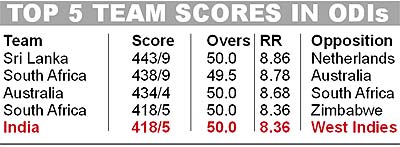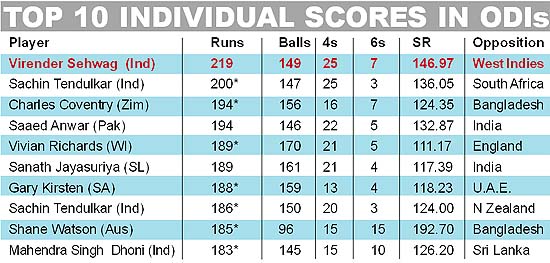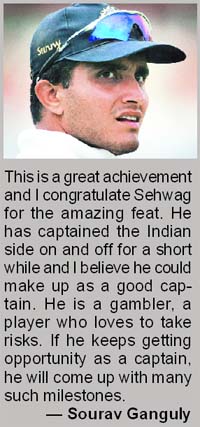Scores 219 off 149 balls (25x4, 7x6)  India clinch series 3-1
India clinch series 3-1  beat windies by 153 runs
beat windies by 153 runs  Rahul Sharma makes impressive debut, scalps three wickets
Rahul Sharma makes impressive debut, scalps three wickets
1. With his score of 219, Sehwag has emerged as the highest-scorer in ODIs
2 .The opener has become only the world’s second cricketer to score a double century in ODIs after Sachin Tendulkar, who had scored an unbeaten 200 against SA in Gwalior in 2010.
 Indore, December 8
Indore, December 8
Swashbuckling opener Virender Sehwag today created history by scoring the highest-ever ODI score of 219 as a merciless India clinched the ODI series against West Indies with a convincing 153-run win in the fourth cricket one-dayer to take an unssailable 3-1 lead. The opening stand of 176 he put on with Gambhir, who cracked 67 in the same number of balls with the help of 11 fours, laid the platform for the record total. And his subsequent 140-run stand for the second wicket with another left-handed batsman Raina, who made 55 in 44 balls, took the score past 300-run mark. Sehwag got life twice during his masterly knock — once on 20 when he escaped a run out chance after being stranded mid-pitch and then on 170 when rival captain Darren Sammy dropped an easy catch at extra cover.
The opening stand of 176 he put on with Gambhir, who cracked 67 in the same number of balls with the help of 11 fours, laid the platform for the record total. And his subsequent 140-run stand for the second wicket with another left-handed batsman Raina, who made 55 in 44 balls, took the score past 300-run mark. Sehwag got life twice during his masterly knock — once on 20 when he escaped a run out chance after being stranded mid-pitch and then on 170 when rival captain Darren Sammy dropped an easy catch at extra cover.
Virender Sehwag is in a league of his own. The fiery batsman can drive the opposition, as well as his fans, to despair with equal aplomb. The most effective and one of the most pugnacious batsmen ever seen in India, Viru doesn’t really care how he gets his runs. Or if he gets out while trying to get them, for that matter.
 The issue of getting a double-century in One-day Internationals was a matter of when, not if. This ‘when’ however, had begun bothering his support group as several unsavoury injury related incidents in the recent past made them wonder if Viru will ever be the same batsman again. Those questions were answered at the Holkar Cricket Stadium in Indore today in no uncertain terms – Viru lives on. In fact, he just destroyed the record books.
The issue of getting a double-century in One-day Internationals was a matter of when, not if. This ‘when’ however, had begun bothering his support group as several unsavoury injury related incidents in the recent past made them wonder if Viru will ever be the same batsman again. Those questions were answered at the Holkar Cricket Stadium in Indore today in no uncertain terms – Viru lives on. In fact, he just destroyed the record books.
India’s most headline-grabbing tour this year, barring the World Cup win, was the England series where everything that could go wrong, did. Sehwag was on the injury list then, with a dodgy shoulder, and ear infection and vertigo to go with it. He was nevertheless deployed by a desperate team management as things fell apart. The result was a king pair (two first ball ducks) in the Edgbaston Test.
The tongues started wagging.
So, while the Indian cricket scenario thereafter focussed on when Sachin Tendulkar would get his 100th international century, Viru quietly got back to business. Nothing to flashy anywhere, and some innings that didn’t impress (didn’t we say he can drive fans to despair?). The wagging became faster.
Then came the home series against England and the West Indies. Sehwag stayed out of the ODIs against England and even in the three Tests against the West Indies, where it was a virtual run-fest, Viru had to be satisfied with three half-centuries, frequently getting settled and getting out. Things weren’t looking too good.
 Then came the five-match ODI series against the Caribbeans and Sehwag suddenly found captaincy in his lap, as Mahendra Singh Dhoni decided to take a break. The first three games weren’t too great for the new captain, as he got 46 runs in three innings, including a duck at Vizag as the West Indies came roaring back to post a win.
Then came the five-match ODI series against the Caribbeans and Sehwag suddenly found captaincy in his lap, as Mahendra Singh Dhoni decided to take a break. The first three games weren’t too great for the new captain, as he got 46 runs in three innings, including a duck at Vizag as the West Indies came roaring back to post a win.
All that changed in Indore.
Madhya Pradesh, the heart of the country, suddenly has become the heartthrob for Indian cricket too. It was in Gwalior where the record books were re-written when Tendulkar breached the 200-barrier against South Africa on February 10, 2010. It is now Indore’s turn to celebrate its inclusion in the annals of cricket history.
Sehwag is by far the best Indian batsman ever. He holds the highest Test score for India and the top ODI score in the world, getting these runs at an incredible pace, giving the bowlers time enough to work on the opposition. He wins more matches, or sets up more matches than anyone else.
Still, he saunters around with a broad smile on his face. The smile doesn’t vanish for too long, whether he hits a six to get from 294 to 300, or whether he fails while attempting one. That is what makes him a great cricketer – the man within.
1. With his score of 219, Sehwag has emerged as the highest-scorer in ODIs
2 .The opener has become only the world’s second cricketer to score a double century in ODIs after Sachin Tendulkar, who had scored an unbeaten 200 against SA in Gwalior in 2010.
 Indore, December 8
Indore, December 8Swashbuckling opener Virender Sehwag today created history by scoring the highest-ever ODI score of 219 as a merciless India clinched the ODI series against West Indies with a convincing 153-run win in the fourth cricket one-dayer to take an unssailable 3-1 lead.
The 33-year-old Sehwag was at his explosive best as he became only the second batsman after Sachin Tendulkar to reach the 200-run landmark in ODIs and propel India to their highest ever one-day total of 418 for five. The hosts then dismissed the West Indians for 265 in 49.2 overs to wrap up the five-match series in style, rendering the fifth match in Chennai on Sunday, inconsequential.
Debutant spinner Rahul Sharma was the pick of the Indian bowlers with three for 43. Electing to bat, it was Sehwag who took centrestage with a stunning exhibition of strokeplay as he plundered runs at will on a belter of a track at the jam-packed Holkar stadium. Sehwag surpassed Tendulkar's 200 not out made from 147 balls against South Africa in Gwalior on February 24 last year when he square-cut Andre Russell for a boundary in the 44th over of the Indian innings to go past the 200 mark. He joined his idol Tendulkar in the record books as the only other cricketer to score double hundred in the limited overs game.
The Delhi marauder, who cracked his second three-figure knock against West Indies and 15th overall in 240 ODI matches, slammed as many as 25 fours and seven sixes during his 149-ball blitz. He also reached his double hundred in fewer balls (in 140 balls with the help of 23 fours and six sixes) than Tendulkar, who took 147 deliveries for his unbeaten 200
 The opening stand of 176 he put on with Gambhir, who cracked 67 in the same number of balls with the help of 11 fours, laid the platform for the record total. And his subsequent 140-run stand for the second wicket with another left-handed batsman Raina, who made 55 in 44 balls, took the score past 300-run mark. Sehwag got life twice during his masterly knock — once on 20 when he escaped a run out chance after being stranded mid-pitch and then on 170 when rival captain Darren Sammy dropped an easy catch at extra cover.
The opening stand of 176 he put on with Gambhir, who cracked 67 in the same number of balls with the help of 11 fours, laid the platform for the record total. And his subsequent 140-run stand for the second wicket with another left-handed batsman Raina, who made 55 in 44 balls, took the score past 300-run mark. Sehwag got life twice during his masterly knock — once on 20 when he escaped a run out chance after being stranded mid-pitch and then on 170 when rival captain Darren Sammy dropped an easy catch at extra cover.When India commenced their innings today, the decision of the Indian team management to tweak the top order paid rich dividends as Sehwag and Gambhir, who replaced Parthiv Patel after the latter had opened in the first three games, ripped apart the Windies bowling attack. The Delhi openers tore apart the rival attack in stunning fashion with Sehwag, who went into the game with scores of 20, 26 and 0, dominating the proceedings. Sehwag clipped the first ball off his pads for a four from Ravi Rampaul, who had dismissed the two openers for first ball ducks in the last game at Ahmedabad on December 5, and then upper cut Kemar Roach over fine third man for a six in the next over to set the tone for a run-spree.
Runs came in a cascade from the two batsmen's blades as the first ten overs yielded 63 runs, while in the next ten the total jumped to 149.

| The issue of getting a double-century in ODIs was a matter of when, not if. This ‘when’ however, had begun bothering his support group as several unsavoury injury related incidents made them wonder if Viru will ever be the same batsman. Those questions were answered in Indore today in no uncertain terms – Viru lives on. |
 The issue of getting a double-century in One-day Internationals was a matter of when, not if. This ‘when’ however, had begun bothering his support group as several unsavoury injury related incidents in the recent past made them wonder if Viru will ever be the same batsman again. Those questions were answered at the Holkar Cricket Stadium in Indore today in no uncertain terms – Viru lives on. In fact, he just destroyed the record books.
The issue of getting a double-century in One-day Internationals was a matter of when, not if. This ‘when’ however, had begun bothering his support group as several unsavoury injury related incidents in the recent past made them wonder if Viru will ever be the same batsman again. Those questions were answered at the Holkar Cricket Stadium in Indore today in no uncertain terms – Viru lives on. In fact, he just destroyed the record books.India’s most headline-grabbing tour this year, barring the World Cup win, was the England series where everything that could go wrong, did. Sehwag was on the injury list then, with a dodgy shoulder, and ear infection and vertigo to go with it. He was nevertheless deployed by a desperate team management as things fell apart. The result was a king pair (two first ball ducks) in the Edgbaston Test.
The tongues started wagging.
So, while the Indian cricket scenario thereafter focussed on when Sachin Tendulkar would get his 100th international century, Viru quietly got back to business. Nothing to flashy anywhere, and some innings that didn’t impress (didn’t we say he can drive fans to despair?). The wagging became faster.
Then came the home series against England and the West Indies. Sehwag stayed out of the ODIs against England and even in the three Tests against the West Indies, where it was a virtual run-fest, Viru had to be satisfied with three half-centuries, frequently getting settled and getting out. Things weren’t looking too good.
 Then came the five-match ODI series against the Caribbeans and Sehwag suddenly found captaincy in his lap, as Mahendra Singh Dhoni decided to take a break. The first three games weren’t too great for the new captain, as he got 46 runs in three innings, including a duck at Vizag as the West Indies came roaring back to post a win.
Then came the five-match ODI series against the Caribbeans and Sehwag suddenly found captaincy in his lap, as Mahendra Singh Dhoni decided to take a break. The first three games weren’t too great for the new captain, as he got 46 runs in three innings, including a duck at Vizag as the West Indies came roaring back to post a win.All that changed in Indore.
Madhya Pradesh, the heart of the country, suddenly has become the heartthrob for Indian cricket too. It was in Gwalior where the record books were re-written when Tendulkar breached the 200-barrier against South Africa on February 10, 2010. It is now Indore’s turn to celebrate its inclusion in the annals of cricket history.
Sehwag is by far the best Indian batsman ever. He holds the highest Test score for India and the top ODI score in the world, getting these runs at an incredible pace, giving the bowlers time enough to work on the opposition. He wins more matches, or sets up more matches than anyone else.
Still, he saunters around with a broad smile on his face. The smile doesn’t vanish for too long, whether he hits a six to get from 294 to 300, or whether he fails while attempting one. That is what makes him a great cricketer – the man within.